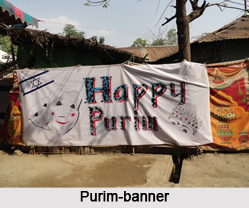 Purim is a joyous Jewish holiday and this interesting festival is celebrated in the Jewish month of Adar that commemorates the saving of the Jewish people from Haman, who was planning to kill all the Jews. The Purim festival is also celebrated to commemorate the triumph of Israel over their enemies when they lived in captivity under the Assyrian king Ahasuerus.
Purim is a joyous Jewish holiday and this interesting festival is celebrated in the Jewish month of Adar that commemorates the saving of the Jewish people from Haman, who was planning to kill all the Jews. The Purim festival is also celebrated to commemorate the triumph of Israel over their enemies when they lived in captivity under the Assyrian king Ahasuerus.
History of Purim Festival
The story is that Haman, the king`s minister, a determined Jew-baiter, decided to massacre all Jews in the kingdom, and in a secret meeting with his henchmen cast lots (hence Purim) to fix the date for the massacre. In the meantime, the beautiful Jewess Esther, the adopted daughter of Mordecai, was married to king Ahasuerus. Haman`s plot was discovered by Mordecai who informed Esther about it. The young queen then prevailed upon her husband to let the Jews massacre all their enemies on the same date, which Haman had fixed for the extirpation of the Jews. So, instead of the Chosen People of God, their enemies were annihilated on this date and Haman himself was hanged on gallows fifty cubits high.
Celebration of the Purim Festival
Purim is celebrated annually on the 14th of the Hebrew month of Adar. As with all Jewish holidays, Purim begins at sundown on the previous secular day. This festival is also characterized by public recitation of the Book of Esther, giving mutual gifts of food and drink, giving charity to the poor, noisemaking, general merriment and a celebratory meal; other customs include drinking alcohol, wearing of masks and costumes, public celebration. Its special dishes include pastries with poppy seeds, dates or fruit. Typical greeting for this and other holidays is `Chag sameach`, "a happy holiday."
In some parts of the Jewish world, but not in India, effigies of Haman are `beaten to death` and set on fire. In India, it coincides with the festival of Holi. Since the Jews were saved by intercession of Esther, the reading of the `Megilath Esther` marks the service in the synagogue. During the reading, the congregations stamp their feet, and children make noises with rattles, every time the name of Haman is uttered during the recital. These actions blot out the memory of the evildoer. A special collection for charity is also made at the end of the service.
The holiday of Purim has been held in high esteem by Judiasm at all times; some have held that when all the prophetical and hagiographical works are forgotten, the Book of Esther will still be remembered, and, accordingly, the Feast of Purim will continue to be observed. Purim`s status as a holiday is on a lesser level than those days ordained holy by the Torah. Accordingly, business transactions and even manual labor are allowed on Purim, though in certain places restrictions have been imposed on work. A special prayer ("Al ha-Nissim"-"For the Miracles") is inserted into the Shemoneh Esrei during evening, morning and afternoon prayers, as well as is included in the Grace after Meals.
Thus, this festival has four main commandments, they are:
•Listening to the public reading, usually in the synagogue, of the Book of Esther in the evening and again in the following morning
•Sending food gifts to friends
•Giving charity to the poor.
•Eating a festival meal.



















